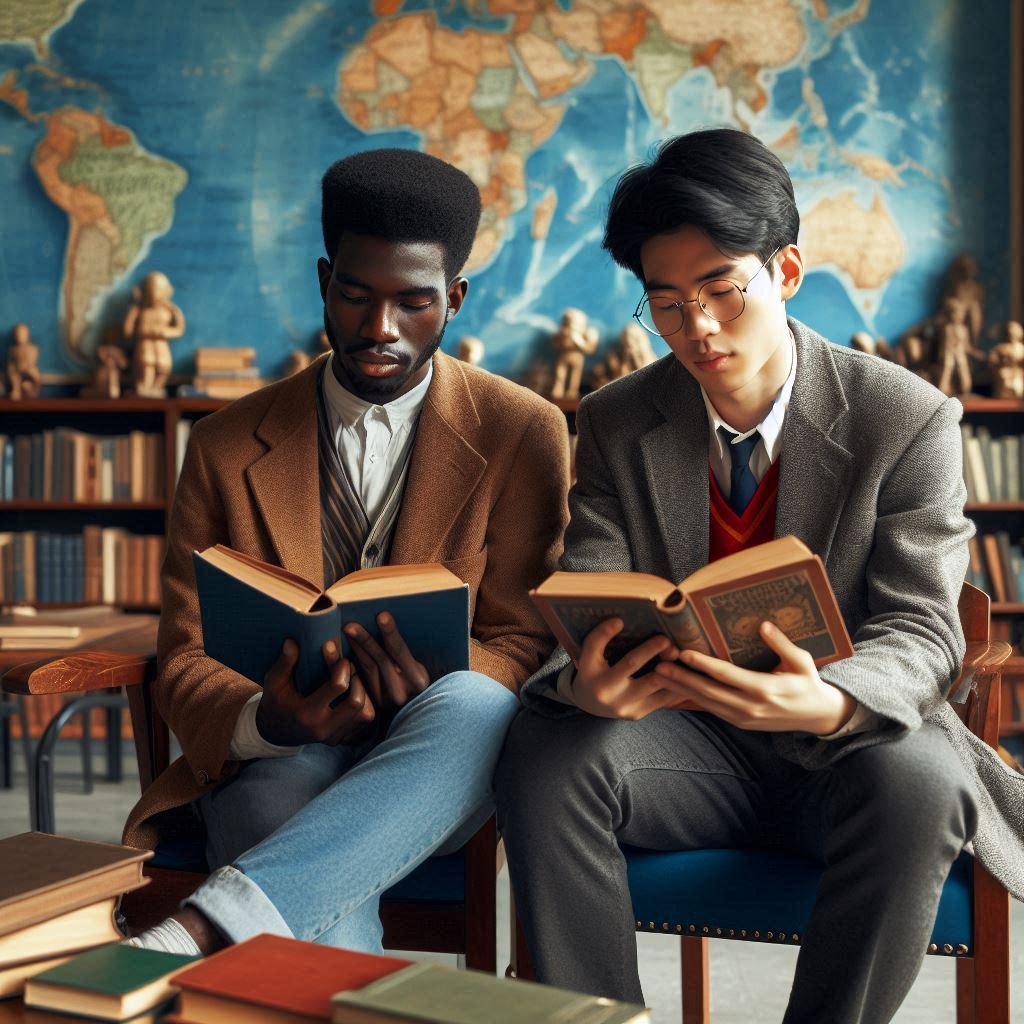Introduction
A brief overview of communication arts reveals its significance in the media industry.
The purpose of discussing its impact on Nigerian media is to explore its influence on the country’s media landscape.
Communication arts encompass various forms of communication, such as visual, digital, and performing arts, that play a crucial role in conveying messages effectively.
In the media industry, these arts are utilized to engage, inform, and entertain audiences through different platforms.
Analyzing Nigerian media requires understanding how communication arts shape narratives, perceptions, and cultural representations.
By examining the interplay of communication arts in the Nigerian media, we can gain insights into the dynamics of influence, creativity, and innovation within the industry.
Through this exploration, we aim to uncover the ways in which communication arts contribute to the evolution and development of the Nigerian media sector.
As a vital component of the media ecosystem, communication arts have the power to inspire, educate, and connect people through compelling stories, visuals, and performances.
Historical Perspective
1. Evolution of communication arts in Nigerian media
Communication arts in Nigerian media have come a long way since the early days of print newspapers and radio broadcasting.
The colonial era saw the rise of communication arts through newspapers like the West African Pilot and Daily Times.
These publications provided crucial information to the public.
2. Influence of traditional media on communication arts
Traditional media, such as newspapers, radio, and television, played a significant role in shaping communication arts in Nigerian media.
These platforms served as the primary sources of information for the masses and helped in shaping public opinion on various issues.
3. Transition to digital media and its impact
With the advent of digital media, there has been a significant shift in how communication arts are practiced in Nigerian media.
Social media platforms, online news sites, and digital content creation revolutionize how information spreads.
4. Impact of digital media on traditional media
The transition to digital media has had a profound impact on traditional media in Nigeria.
Print newspapers and radio stations have adapted by incorporating digital elements into their content delivery.
This adaptation helps them stay relevant and competitive in the evolving media landscape.
5. Accessibility and reach
One of the most significant impacts of digital media on communication arts in Nigerian media is the increased accessibility and reach of information.
The internet’s increased accessibility allows people to access news and information anytime, anywhere.
This breakdown of barriers enhances communication and information dissemination globally.
6. Engagement and interaction
Digital media has also facilitated greater engagement and interaction between content creators and consumers.
Social media platforms have enabled direct communication between journalists, media houses, and the audience, allowing for real-time feedback and discussions on various issues.
This interactive approach to communication arts has made media more engaging and participatory for the public.
Read: Internship Opportunities for Communication Arts Students
Role of Communication Arts in Shaping Public Opinion
Communication arts play a significant role in shaping public opinion in Nigeria.
Various communication channels actively use persuasive techniques to influence public perception and drive social change.
Use of Persuasive Techniques in Media Messaging
Media messaging in Nigeria often employs persuasive techniques to sway public opinion.
These techniques may include emotional appeals, storytelling, and expert opinions to capture audience attention.
By framing messages in a certain way, media outlets can influence how the public perceives specific issues or individuals.
For example, political campaigns in Nigeria often use persuasive messaging to garner support from voters.
Impact of Communication Arts on Public Perception of Political Figures
Communication arts play a crucial role in shaping public perception of political figures in Nigeria.
Media coverage, speeches, and messaging can influence how politicians are viewed by the public.
Positive portrayals can improve a politician’s image, while negative coverage can damage their reputation.
Effective communication strategies can help political figures connect with the public and gain support for their initiatives.
How Communication Arts Can Influence Social Change in Nigeria
Communication arts have the power to drive social change and promote awareness of important issues in Nigeria.
Through impactful messaging, media outlets can mobilize the public to take action on various social issues.
By raising awareness and sparking conversations, communication arts can bring about positive changes in society.
Advocacy campaigns, documentaries, and social media movements all utilize communication arts to drive social change.
In essence, the role of communication arts in shaping public opinion in Nigeria is undeniable.
Transform Your Career with Expert Guidance
Get personalized mentorship consulting that’s tailored to your unique path. Our expert advice is actionable and exclusive.
Get StartedPersuasive techniques in media messaging can profoundly impact society.
They influence public perception of political figures. Additionally, they drive social change through communication arts.
Read: Language Arts Courses: What to Expect in Nigeria
Innovation and Technology
Advancements in communication arts technology
The Nigerian media landscape has seen significant advancements in technology over the years.
These advancements have revolutionized the way information is disseminated and consumed in the country.
With the introduction of digital broadcasting, online news platforms, and social media, the Nigerian media is now more dynamic and interactive than ever before.
Influence of social media on Nigerian media landscape
Social media has played a pivotal role in shaping the Nigerian media landscape.
Platforms like Twitter, Facebook, and Instagram have become essential tools for journalists, media organizations, and the general public to share news, opinions, and information.
Social media has also helped to democratize the flow of information by giving a voice to ordinary citizens and promoting transparency in journalism.
Integration of new media platforms in communication strategies
Nigerian media organizations quickly adopt new technologies to enhance their communication strategie
From live streaming events to creating interactive multimedia content, media outlets are constantly exploring innovative ways to engage their audience and stay relevant in a digital age.
By embracing new media platforms, Nigerian media organizations are able to reach a wider audience, enhance their brand visibility, and stay competitive in a fast-paced industry.
Read: Comparing Communication Arts and Mass Communication

Gain More Insights: Global Conflict Resolution: Nigerian Academic Insights
Learn More: Technological Advances in Historical Research in Nigeria
Media Ethics and Responsibility
Media ethics play a crucial role in shaping the credibility and trustworthiness of the media industry.
Importance of Ethical Communication in Media Industry
- Ethical communication ensures that information is presented truthfully and accurately to the public.
- It helps maintain the integrity of journalism and prevents the spread of misinformation.
- Adhering to ethical standards builds trust between media organizations and their audiences.
Role of Communication Arts in Promoting Transparency and Accountability
Communication arts, such as journalism, broadcasting, and public relations, play a key role in promoting transparency and accountability within the media industry.
Journalists investigate and report on issues of public interest, holding those in power accountable for their actions.
Broadcasters provide a platform for diverse voices and opinions to be heard, fostering transparency in the dissemination of information.
Public relations professionals help organizations communicate openly and honestly with the public, establishing trust and credibility.
Addressing Ethical Challenges in Nigerian Media through Communication Arts
In Nigeria, the media industry faces various ethical challenges that can be mitigated through the effective application of communication arts.
Promoting ethical reporting practices addresses the challenge of fake news and misinformation spread effectively.
Media coverage lacks professionalism and objectivity, but training in communication arts can enhance it.
Upholding ethical standards and values can tackle bribery and corruption in media organizations effectively.
Communication arts uphold ethics and responsibilities in the Nigerian media industry. They ensure truthful, accurate, and transparent information dissemination.
Read: Essential Skills for Success in Communication Arts
Explore Further: Top 10 Mass Communication Schools in Nigeria
Find Out More: Specializations in Mass Communication Degrees Nigeria
Cultural Representation and Diversity
When it comes to cultural representation and diversity in Nigerian media, the impact of communication arts cannot be understated.
Through various forms of communication such as television, radio, print, and digital media, Nigerian media plays a significant role in portraying the diverse cultures present in the country.
Impact of communication arts on portrayal of diverse cultures in Nigerian media
Nigerian media profoundly represents diverse cultures through active engagement in communication, visual, performing, and media arts.
Through storytelling, imagery, and sound, communication arts help to bring the richness and diversity of Nigerian cultures to a wider audience.
Representation of minority groups in media messaging
One of the key roles of communication arts in Nigerian media is the representation of minority groups.
Inclusive and diverse storytelling in communication arts amplifies marginalized voices and ensures their stories are heard.
This approach respects and acknowledges the experiences of underrepresented communities.
Role of communication arts in bridging cultural divides in Nigeria
Communication arts play a vital role in bridging cultural divides in Nigeria by fostering understanding, empathy, and respect among different cultural groups.
Through the power of storytelling and visual representation, communication arts help to promote inclusivity and unity in a country as diverse as Nigeria.
In general, the impact of communication arts on cultural representation and diversity in Nigerian media is undeniable.
Communication arts promote inclusivity by showcasing Nigeria’s diverse cultures.
They foster respect among Nigerians. Additionally, they encourage mutual understanding.
Find Out More: Benefits of Studying Communication in Nigeria
You Might Also Like: How to Apply for African and Asian Studies Programs
Conclusion
The impact of communication arts on the Nigerian media landscape is undeniable. It has revolutionized the way information is disseminated and consumed in the country.
Through various mediums such as print, broadcast, and digital platforms, communication arts have played a crucial role in shaping public opinion and driving societal change.
The integration of communication arts has enhanced the quality of journalism and storytelling in Nigerian media, allowing for more engaging and informative content.
Overall, communication arts have contributed to the democratization of information and the promotion of freedom of speech in Nigeria.
Looking ahead, there are numerous opportunities for further development and innovation in the Nigerian media industry through communication arts.
Future directions may include leveraging new technologies, fostering collaboration between different media outlets, and addressing challenges such as fake news and misinformation.
Overall, the future looks bright for communication arts in Nigeria, as they continue to play a pivotal role in shaping the country’s media landscape and reflecting its diverse voices.




